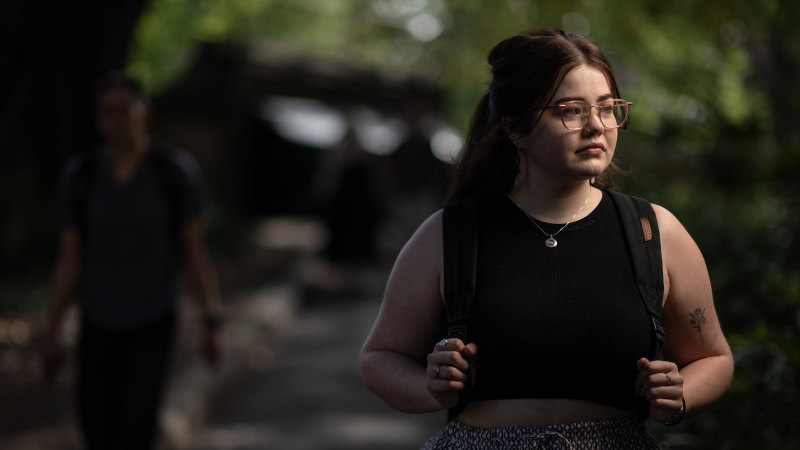
Barbara is forced to take the long way home to avoid an unsafe commute
November 15, 2023Save articles for later
Add articles to your saved list and come back to them any time.
Barbara Honeysett feels constantly on edge as she walks home from the train station after work, holding her keys in her pocket with one hand and a phone to her ear with the other.
Each night, the 25-year-old is forced to choose between feeling unsafe while navigating an eerie path between Tempe station and her apartment, or taking a much longer and steeper route from Marrickville station, just to feel at ease.
Barbara Honeysett feels unsafe walking home from her closest train station at night.Credit: Photo: Wolter Peeters
“Tempe station is quite isolated. There are no businesses around, just residential areas, and where I have to walk, there’s a river on one side and a soccer pitch on the other,” the policy and research officer based in Darlinghurst said.
“In that stretch, there is very little lighting. There’s no security cameras; there’s lots of trees and places people can hide. I try to avoid it at all costs”.
Honeysett feels the onus should not be on women to spend more time and money to feel safe while commuting, whether that’s taking longer journeys, ordering several Ubers or opting to drive instead of taking public transport.
She’s not alone. From Wednesday, she and others will be able to pinpoint the exact public spots where safety is an issue and share their anonymous experiences on a new interactive map. Called YourGround NSW, the aim of the initiative is to make public spaces safer for women and gender-diverse people.
NSW women’s safety commissioner Dr Hannah Tonkin (left) with Associate Professor Nicole Kalms (right), the lead researcher of the YourGround NSW project.Credit: Photo: Kate Geraghty
The project has been funded under the NSW government’s $30 million Safer Cities program, and was developed in partnership with the NSW Women’s Safety Commissioner, Dr Helen Tonkin, and the Department of Communities and Justice and Transport for NSW.
In an alarming finding, 59 per cent of women who contributed to the transport department’s 2023 NSW Safer Cities Survey reported feeling “not so safe or not at all safe” in public spaces after dark, compared to 32 per cent of men.
The survey of nearly 5500 residents found 76 per cent of women would walk more and 69 per cent would catch more public transport if they felt safer.
Tonkin said the perception of a lack of safety could prevent women and gender-diverse people from participating in public life at night.
The YourGround project in Victoria was launched in 2021.
“The data and insights that are gathered from this project will help improve decision-making and inform policies and programs,” she said.
“That’s not only in terms of planning public spaces, lighting and transport routes, but also by raising awareness about the behaviour of people in public spaces as part of a whole community effort to prevent violence against women.”
The YourGround project is focused on public spaces such as streets, parks, walkways, and areas surrounding train stations and bus stops, but the transport hubs themselves are not included.
The brainchild of Associate Professor Nicole Kalms, from Melbourne’s Monash University, YourGround was launched in Victoria in 2021 and gained 6000 submissions.
YourGround in Victoria attracted 6000 submissions, and is helping local councils consider planning, design and infrastructural changes.
Kalms, whose background is in architecture and urban design, said there was a “real gap in the ways we’re thinking about planning cities, and particularly in relation to things like crime prevention and women’s safety”.
“This project starts to build a gender-sensitive data set that allows for local communities to have evidence that supports what they want to do (such as) change infrastructure, initiate new forms of lighting and accessibility, and maybe think differently about how they might deal with issues of safety,” Kalms said.
While Kalms described YourGround as a “long game”, she said it was already helping local councils in Victoria consider planning, design and infrastructural changes.
Kalms said the project encouraged a diverse range of suggestions from women across NSW to offer ideas depending on their specific experiences, which go beyond obvious ones such as more CCTV surveillance.
“One really interesting one is a tendency for urban planners, and actually even women themselves, to sometimes think that things like CCTV will solve problems or prevent crime,” she said.
“But there’s no research or evidence that supports that in terms of women’s experiences. Because CCTV is used once something awful has happened as a kind of forensic tool. It doesn’t necessarily make women feel safer in the moment. They might see CCTV, and think, oh, there’s a reason that that camera is here, and that’s because this is potentially an unsafe place.”
The YourGround NSW map is open for submissions by women and gender-diverse people from November 15 to February 8 and can be found at yourground.org.
Start the day with a summary of the day’s most important and interesting stories, analysis and insights. Sign up for our Morning Edition newsletter.
Most Viewed in National
From our partners
Source: Read Full Article






